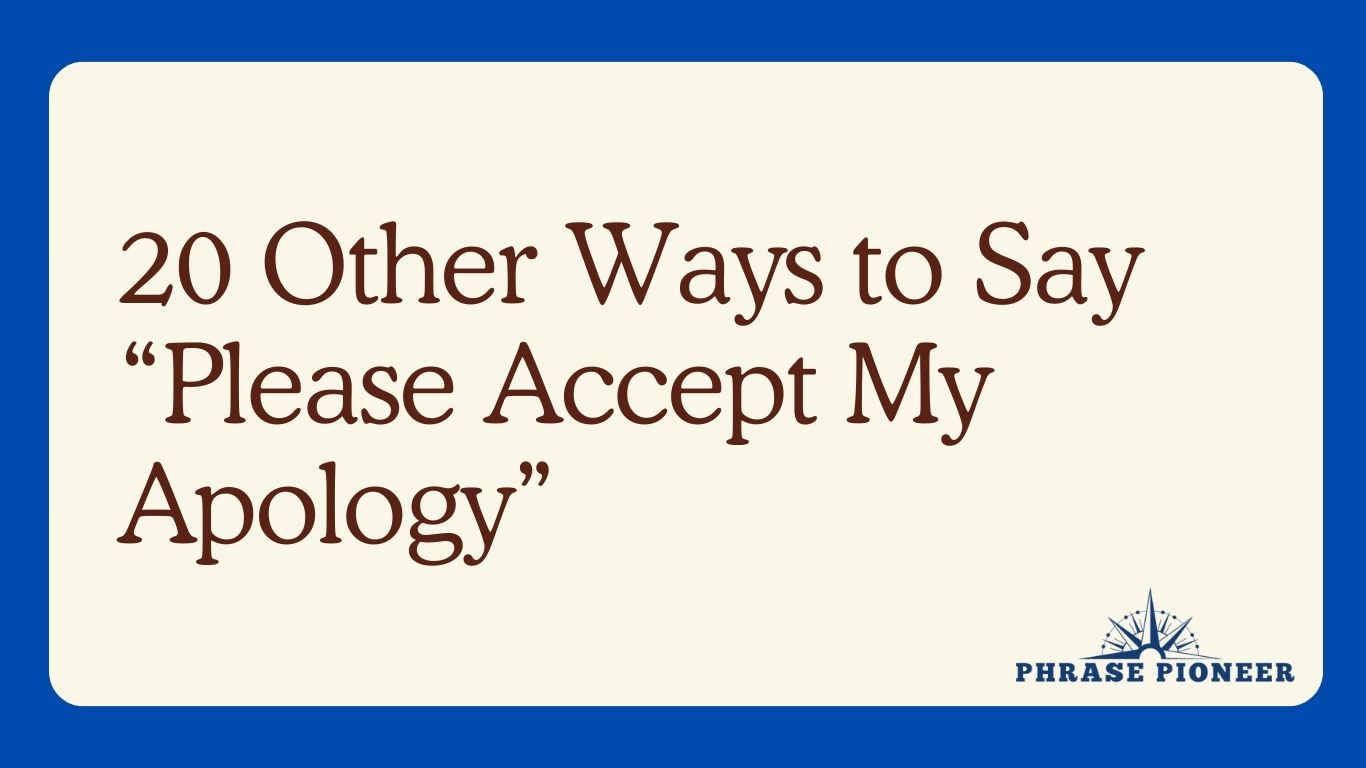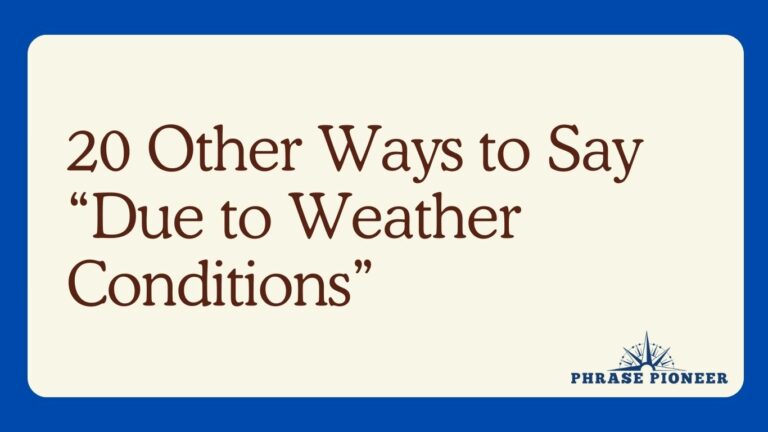20 Other Ways to Say “Please Accept My Apology”
Offering a sincere apology when you’ve wronged someone is essential for mending and maintaining healthy relationships.
Here are 20 alternative ways to say “Please accept my apology,” complete with example sentences and explanations, to help you express remorse and seek forgiveness considerately.
Expressing Sincere Regret:
1. “I deeply regret my actions and humbly ask for forgiveness.”
- Example: “I deeply regret my actions at the meeting and humbly ask for forgiveness.”
- Explanation: Indicates a profound sense of remorse while respectfully requesting pardon.
2. “I sincerely apologize and hope for your understanding.”
- Example: “For missing the deadline, I sincerely apologize and hope for your understanding.”
- Explanation: Combines a heartfelt apology with a plea for sympathy.
3. “My sincerest apologies for any distress caused.”
- Example: “My sincerest apologies for any distress caused by my error in judgment.”
- Explanation: Shows deep regret for any emotional pain or inconvenience as a result of one’s actions.
4. “I seek your forgiveness for my mistake.”
- Example: “I overlooked important details. I seek your forgiveness for my mistake.”
- Explanation: Directly asks to be forgiven for the wrongdoing committed.
5. “Kindly accept my heartfelt apology.”
- Example: “An oversight like this won’t happen again—kindly accept my heartfelt apology.”
- Explanation: Emphasizes the apology’s earnest nature and requests acceptance of it.
Acknowledging Fault:
6. “Please allow me to express my remorse.”
- Example: “I acknowledge the consequences of my decisions—please allow me to express my remorse.”
- Explanation: Requests permission to show true feelings of contrition.
7. “I take full responsibility and apologize.”
- Example: “Regarding the misunderstanding, I take full responsibility and apologize.”
- Explanation: Accepts complete blame and offers an apology for the incident.
8. “I’m truly sorry and hope to mend things.”
- Example: “Our relationship matters to me. I’m truly sorry and hope to mend things.”
- Explanation: Expresses a genuine sense of sorrow and a desire to repair the relationship.
9. “I regret any inconvenience and ask for your pardon.”
- Example: “The delay was unintentional. I regret any inconvenience and ask for your pardon.”
- Explanation: Apologizes for any trouble caused and seeks formal forgiveness.
10. “Please forgive my oversight.”
- Example: “What I did was not appropriate. Please forgive my oversight.”
- Explanation: Seeks absolution for a specific lapse or mistake.
Seeking Reconciliation:
11. “I offer my apologies and seek to make amends.”
- Example: “I offer my apologies for the error and seek to make amends by rectifying it.”
- Explanation: Puts forward an apology and indicates the drive to correct the mistake.
12. “Allow me to atone for my action.”
- Example: “My remarks were out of line—allow me to atone for my action.”
- Explanation: Asks for an opportunity to make up for the wrong behavior.
13. “I extend my apologies and wish to make it right.”
- Example: “Letting the team down was not my intention. I extend my apologies and wish to make it right.”
- Explanation: Offers an apology and communicates the desire to take remedial actions.
14. “It was inexcusable, and I plead for forgiveness.”
- Example: “Missing that crucial meeting was inexcusable, and I plead for forgiveness.”
- Explanation: States that the wrongdoing has no justification and begs to be pardoned.
15. “Let me make up for my mistake, I am sorry.”
- Example: “The mix up with the orders was my fault. Let me make up for my mistake, I am sorry.”
- Explanation: Assumes responsibility for an error and offers an apology with the intent to remedy the situation.
Offers of Contrition:
16. “I hope you can accept my sincere apology.”
- Example: “I didn’t mean to hurt your feelings. I hope you can accept my sincere apology.”
- Explanation: Wishes that the person can acknowledge and accept the remorse being expressed.
17. “I owe you an apology and seek your forgiveness.”
- Example: “I was wrong in my assumptions; I owe you an apology and seek your forgiveness.”
- Explanation: Conveys owing an apology as a debt and asks for clemency.
18. “With regret, I ask for your absolution.”
- Example: “The comments I made were ill-considered. With regret, I ask for your absolution.”
- Explanation: Expresses remorse and requests to be released from blame or guilt.
19. “My actions were misguided; please accept my apology.”
- Example: “I recognize why my actions were misguided; please accept my apology.”
- Explanation: Admits that the actions taken were wrong and requests understanding and forgiveness.
20. “I hope you can overlook my fault and allow me to apologize.”
- Example: “In haste, I spoke without thinking. I hope you can overlook my fault and allow me to apologize.”
- Explanation: Asks the person to consider forgiving the fault and permits the speaker to express regret.
Using these different ways to apologize acknowledges your responsibility and expresses a clear desire to be forgiven, which can help restore trust and signal your commitment to rectify the situation.
Whether the apology is informal or formal, personal or professional, the sincerity of the sentiment is what resonates with the recipient and facilitates the rebuilding of relationships.







